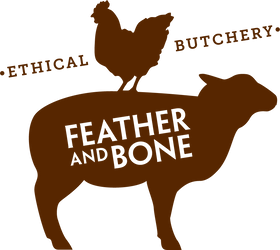Pastured pig competition winners & African Swine flu...
Announcing the first (May) winners of The Year of the Pastured Pig competition! To celebrate The Year of the Pastured Pig, for six months from May to October we're giving away one sixth of a whole, NSW pastured pig. We've just drawn our first winners.
But first, feast your eyes on those lovely pigs above, trotting through the grass at Extraordinary Pork, near Dubbo. The photo was taken by the talented Alex Hicks during Mr Bone's last visit to Alex and Michael's farm and it's a reminder of the way that a paltry 3% of fortunate, pasture-raised Australian pigs live. Not all pigs are so lucky.
Before we talk winners, let's talk African Swine Flu.
Chinese all over the world may be celebrating the zodiac year of the pig, but for real pigs living in intensively-managed hog farms in China, the year of the pig has been worse than usual as a wave of deadly African Swine Flu sweeps across Asia. Up to 2 million Chinese pigs have been culled (some in live burials) in a desperate attempt to curb the spread of the virus which continues to rampage through Asia and is showing up in Europe. There's no cure and it's fatal so immediate 'disposal' is the only option.
But conditions in the Chinese pork industry are perfect for disease incubation and distribution. The majority of China's 440 million pigs are jammed into vast, closed sheds where keeping disease at bay is a constant battle and the incarcerated pigs lack the vigorous and complex antibodies developed by animals that are raised outside. In addition, it's a genetic monoculture of Landrace breed pigs which (like the dominant white broiler chicken) have been bred for desirable characteristics - docile, quick growing, long bodies that yield a higher proportion of belly and loin, lean and with no unsightly black hairs. This allows the industry to deliver a commercially consistent product, but the intrinsic fragility of monocultures just amplifies the vulnerability of the system. When something like African Swine Flu comes along, there's no genetic diversity, hybrid vigour or healthy natural antibodies to help with the offensive.
(Oddly, most discussions about containment seem to conclude that the only option is to restructure the industry so that only operators large enough to invest in serious biosecurity remain. In other words, the problem isn't the idea of a factory that necessitates rampant cruelty and environmental degradation to produce meat as though it were any other kind of inanimate commodity, the problem is that we just haven't perfected the technique yet.)
As far as we know, conditions for intensively-raised pigs in Australia aren't quite as dreadful as they are in China - but, we couldn't really be sure because the big, Australian pork producers like Rivalea won't allow anyone into their sheds to see. (In 2016, Matthew Evans spent a year trying to get access to a large scale intensive pig farm with no luck which, of course, just made him even more suspicious. What is so awful that they don't want us to see it?)
In 'Bred Free Range' systems, the sows have a better time of it because they are permitted to farrow outside in paddocks, but the piglets destined for market are weaned at about three weeks and then spend the remaining four months or so in sheds. Which means the pork you're eating isn't free range at all. Certified Free Range pigs, such as the big, Queensland Borrowdale brand, are another notch up the humane ladder because all pigs have access to outside areas.
But it's very unclear exactly what that actually means. There are a lot of appealing statements about 'displaying natural behaviours' and 'freedom to truffle, play and wallow in the mud' but no real information or photographs about how these outside areas are managed on a daily basis. If large numbers of pigs are digging and grazing in the same paddock adjoining a fixed shed every day, day in, day out, the paddock would be reduced to dust pretty quickly.
After spending several hours wading through the various Australian Pork Limited standard documents, I am still none the wiser as to the specific guidelines relating to the management and size of the outside areas accessible by pigs from fixed sheds and the stocking numbers of pigs in those areas and in the sheds. It's all a bit of a mystery.
What we do know, without a shadow of a doubt, is that about 97% of pigs in Australia are white skinned and raised predominantly inside sheds.
A small percentage, about 3%, are made up of different breeds (including black-skinned pigs) and are raised in a rotational, pastured system with mobile shelters and regular, usually weekly, access to fresh paddocks. These pigs are genuinely free to express instinctive behaviour, to dig and graze and explore and the farmers welcome scrutiny, happily share information and are proud of the way they raise their pigs. This is the pasture-based production system that we support and that we're celebrating in this Year of the Pastured Pig.
Right, let's get onto announcing the inaugural winners.
May winners of The Year of the Pastured Pig competition!
Ladies and Gentlemen, yesterday we drew our two inaugural, May winners! Please put your hands together for the lovely Andrew Stockings and the lovely Maggie Godin who will each be taking home over 3.0 kg of Wessex Saddleback breed pork neck, shoulder and fresh chorizo sausages. On receiving the news, Andrew said 'You little beauty!' and Maggie said 'Hell yeah!', so we think they were pretty chuffed.
Now it's your turn. Will you be one of our two June winners?
YEAR OF THE PASTURED PIG ~ PORK GIVEAWAY!
To celebrate The Year of the Pastured Pig, for six months from May to October we're giving away one sixth of a whole, NSW pastured pig.
Buy a Feather and Bone box to be in the running to win.
We'll draw the second winner on 1 July.




Leave a comment